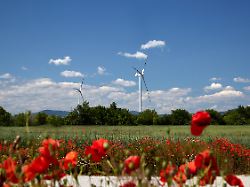Even with the once so generous investors, the money is no longer loose. A number of young and innovative companies are having problems accessing fresh capital. But there is one exception: Record sums are now flowing into climate and energy start-ups of all things. Why?
Money was loose for investors for a long time. They didn’t mind when startups prioritized growth over profit. But those times are over. After a boom year in 2021, when the local startup industry benefited from a digitization push during the pandemic and risk-taking investors, the market has turned around since 2022. In the meantime, restraint prevails again: the majority of German start-ups have difficulties in getting fresh capital. According to a survey for the digital association Bitkom, eight out of ten startups say that investors have recently been very reluctant to inject money.
But there is one exception: climate start-ups are currently doing particularly well with investors. “The energy market is a very regulated market. That has put many investors off for a long time. In the meantime, however, the political framework conditions have changed both at EU level and in Germany in such a way that climate start-ups now have an extreme tailwind,” says Pia Dorfinger from the German Energy Agency (dena) ntv.de
According to an analysis by the management consultancy Oliver Wyman, climate start-ups raised a record sum of 12.3 billion US dollars last year. This means that the total amount of global venture capitalists has increased more than sixfold compared to 2019. According to the authors, this reflects the realization that new solutions to facilitate the energy transition will have top priority for companies in the future.
Co-author Thomas Fritz adds in an interview with ntv.de: “The energy crisis was clearly an accelerator and an additional wake-up call. Without it, it would certainly have taken five years longer for climate start-ups to make it onto the market with this intensity. ” Dorfinger also agrees with this assessment: “The energy crisis has definitely brought more pressure on.” There has already been an increase in interest. “But the Ukraine war definitely accelerated development because the demand for innovative technologies has increased enormously.”
Capital requirements are far from covered
Even if money hasn’t been particularly easy for investors lately, according to Fritz, venture capitalists are convinced: “Climate start-ups are a safe growth area, even independent of economic contraction phases.” Indeed, the global climate technology market offers great growth potential. Despite the record amount of investments, the capital requirements of climate start-ups are far from being covered. According to Dorfinger, climate start-ups in the hardware sector in particular have a high capital requirement. “Unlike software-based solutions, the hardware area is often about setting up production or factories – and that costs a lot of money.”
According to the “Digital Report” by the European Center for Digital Competitiveness, the total market for so-called green techs will be around 1.2 trillion US dollars by 2030. Energy expert Fritz therefore does not assume that the current reluctance of investors will also affect climate start-ups so quickly: “The boom in climate start-ups will not stop. The conversion of the energy system, as we need it in the future, depends on intelligent solutions that many startups provide.”
According to the study, technologies with a focus on increasing energy efficiency and reducing electricity bills are particularly popular with investors in Germany. “The focus on energy costs is the result of inflation fueled by the corona pandemic and the Ukraine war,” the analysis said. It would have made investors aware of the opportunities offered by fragmented and decentralized energy markets.
Despite the difficult capital market environment, the energy start-up 1Komma5Grad recently managed to achieve “unicorn status” as part of a new round of financing. This is the name given to companies with a valuation of at least one billion US dollars. The provider of environmentally friendly energy systems for buildings announced that investors had made a total of 215 million euros available. The company from Hamburg offers its customers solar systems, heat pumps, electricity storage and wall boxes and networks these components with each other. In order for this to succeed, the startup buys up craft businesses. In return, they share in the profits via so-called re-participation options.
Need to catch up despite record investment
Energy expert Fritz is certain: Other climate start-ups will also become unicorns in the foreseeable future. “It is remarkable how many companies have established themselves on the market in such a short time.” It will be exciting now in the next few years: After the venture capitalists, who invests in innovative energy companies? Which established players are positioning themselves in the field? According to information from “Spiegel”, Shell was also allegedly interested in the current round of financing from 1Komma5Grad. The start-up is said to have immediately rejected participation.
According to Fritz, each company has to decide for itself whether an energy start-up wants to accept money from a fossil-based company. However, the mere interest of such companies in a climate start-up is an important signal. “It shows that many traditionally more ‘fossil’ companies have recognized that their portfolio needs to change.”
Even though investments in climate start-ups have reached a new record, startup expert Dorfinger still sees a need to catch up. “In Germany, startups may still be able to raise money relatively easily in the early stages. But it becomes problematic for many at the latest when it comes to commercialization and scaling.” She would therefore not be surprised if more established industrial companies would invest in innovative start-ups in the future. If only to drive their own decarbonization faster.
